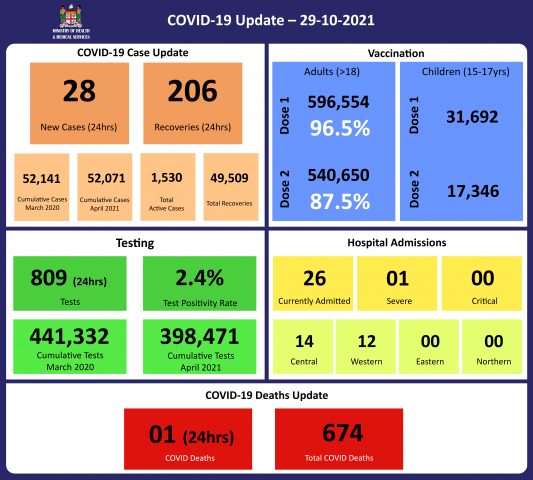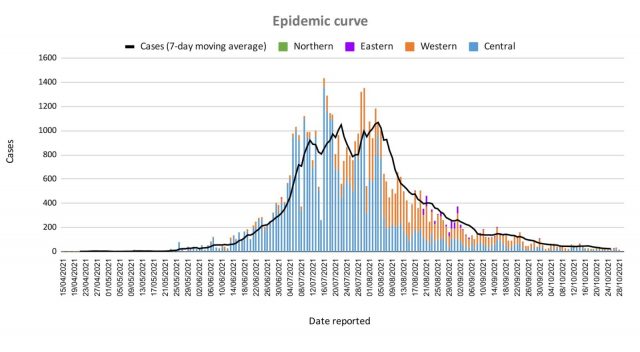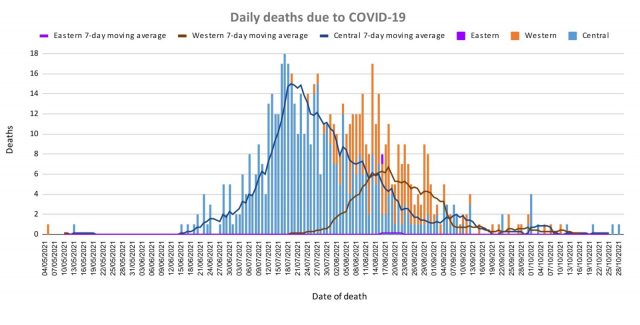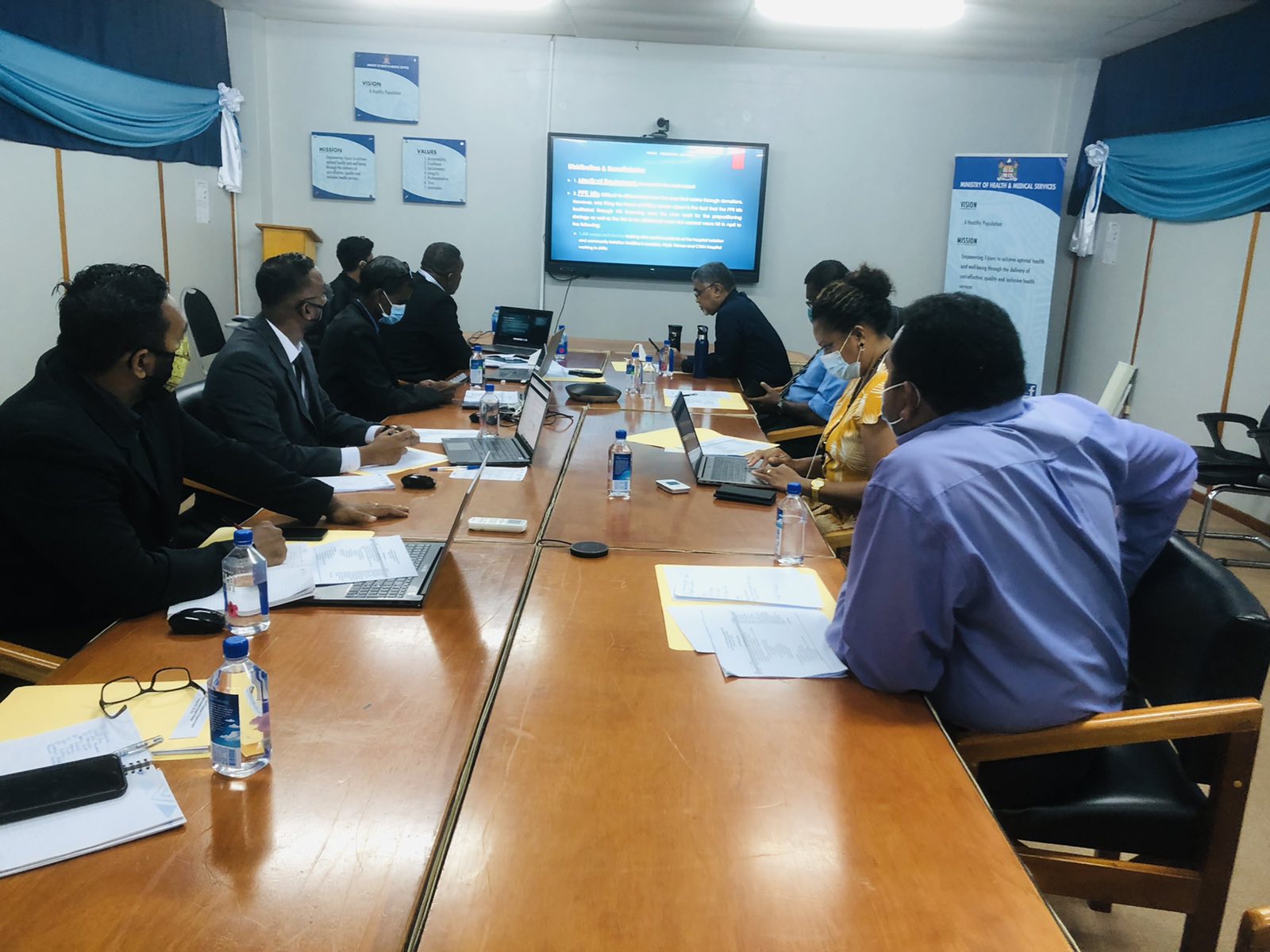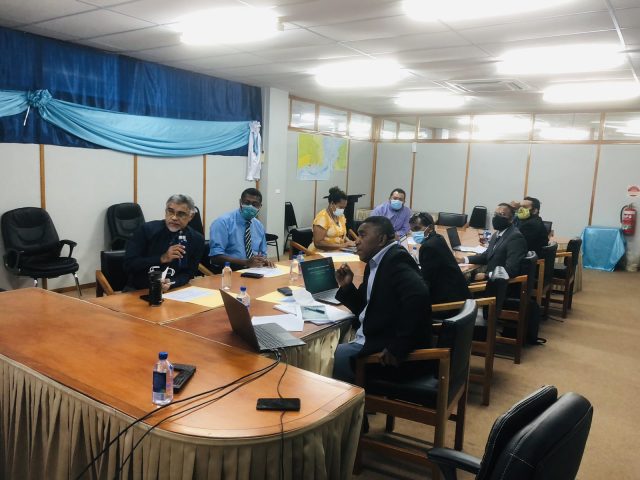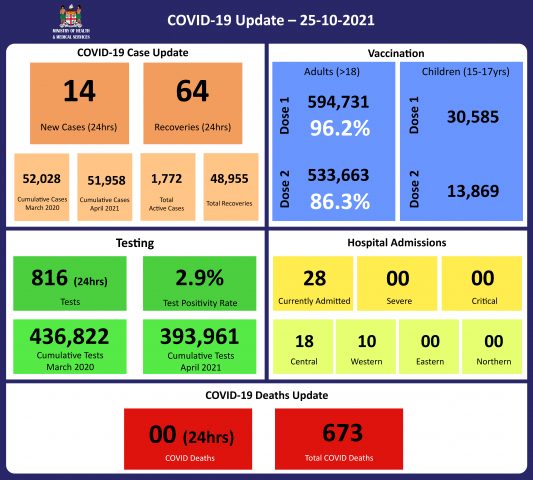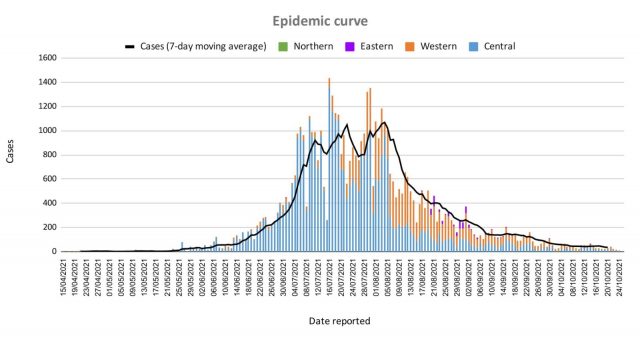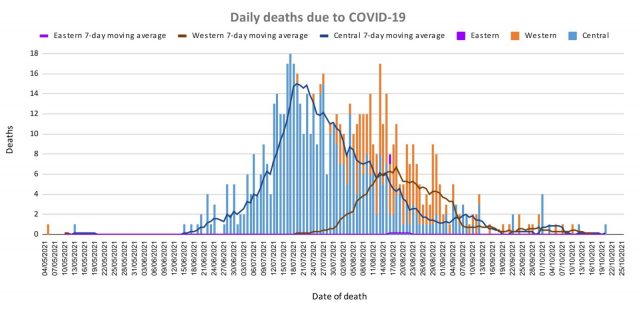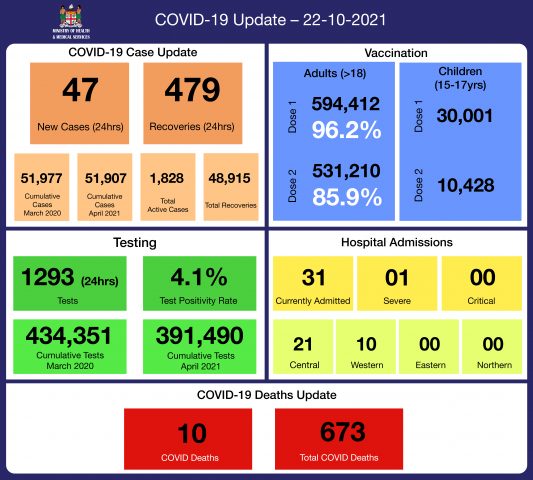
Transmission Update: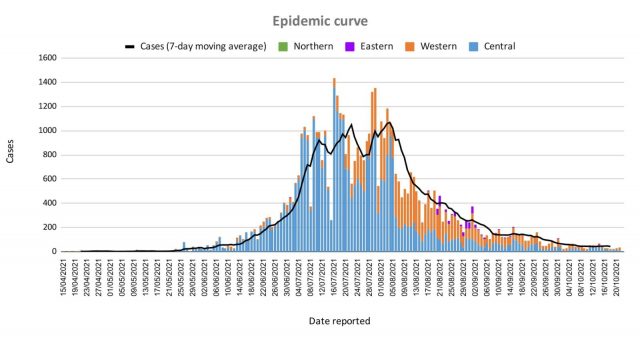
Since the last update, we have recorded a total of 146 new cases, of which 85 new cases were recorded on 16/10/2021; 39 new cases on 17/10/2021, and 22 new cases in the last 24 hours ending at 8 am this morning.
This epidemic curve depicts the daily positive cases since the 2nd wave of this outbreak began in April 2021. Overall, there have been 51,777 cases recorded, with 71% of the cases from the Central Division, 27% of the cases from the Western Division, and 2% of the cases from the Eastern and Northern Division. Our National 7- day rolling average is 43 daily cases calculated for 14th October 2021. |
Deaths: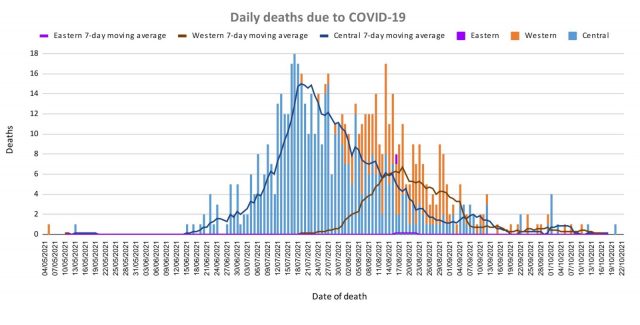
We have an additional 10 COVID-19 deaths to report for the period 2nd August 2021- 20th October 2021. Nine deaths were reported from the Western Division and one from the Central Division. An analysis of the 10 deaths highlighted that individuals were aged between 45 to 92 years, 56% (n=6) were males, all 10 individuals died at home or on their way to the hospital and 67 % (n=6 ) of these deaths were unvaccinated, the remaining 33% (n=4) received only one dose of the vaccine. This means that there were no deaths of individuals who were fully vaccinated. Nine of these deaths were reported from August today due to a delay in the issuance of the death certificates.
There have been 12 deaths of COVID-19 positive patients. However, these deaths have been classified as Non-COVID-19 deaths by the doctors, as patients died of serious pre-existing medical conditions. There have been 673 deaths due to COVID-19 in Fiji, with 671 of these deaths during the outbreak that started in April this year. Please note that due to the time required by clinical teams to investigate, classify and report deaths, a 4-day interval is given to calculate the 7 days rolling average of deaths, based on the date of death, to help ensure the data collected is complete before the average is reported. Therefore, as of October 16th, the national 7 days rolling average of COVID-19 deaths per day is 1.1. The 7 days rolling average for COVID-19 deaths per day in the Central Division is 0.1 and 0.1 in the Western Division.
We have also recorded 559 COVID-19 positive patients who died from the serious medical conditions they had before they contracted COVID-19; these are not classified as COVID-19 deaths. |
Epidemic Outlook:
The 7-day average of new cases per day is 40 cases per day or 45 cases per million population per day. As previously announced by the Permanent Secretary, the daily case numbers are currently not being used as the sole indicator to monitor the progress of the outbreak. The Ministry continues monitoring other indicators such as test positivity, hospitalisations, and deaths to track the progress of the outbreak, and it is noted that there is a downward trend across all indicators of the COVID-19 epidemic in Fiji.
With the reduction in testing numbers, which is above the WHO recommended rate of 4 tests per 1,000 population per week (or approx. 3,500 tests per week), we will transition to community surveillance testing as severe disease numbers and positivity rates approach the containment phase levels.
Public Advisory:
International Travel
From 11th November through to 1st December 2021, Fiji will only accept fully vaccinated permit holders, Fijian passport holders, and returning residents who will be required to undertake a 3-day quarantine in a Fiji Managed Quarantine facility and will be subject to RT-PCR tests 72 hours pre-departure and in-country. Beginning 1st December 2021, Fiji will be open to fully vaccinated travelers from Travel Partner Countries for reduced quarantine arrangements on arrival.
The Ministry of Health and Medical services is also in the final phases of:
- Re-escalating our community surveillance back to containment phase levels with a strong emphasis on our careFIJI to facilitate tracking and rapid contact tracing efforts;
- Strengthening our line listing for positive cases and vulnerable persons;
- Ensuring better access to Clinical monitoring and outreach capability and retrieval services for those in the line list;
- Strengthening our Clinical Care Protocols
The public is reminded that there will always be people vulnerable to the virus despite our high vaccination coverage. We have one-third of the population under 18 years old, most of whom still need to be vaccinated. We will have older people with comorbidities whose ability to build up vaccine immunity is not as good as younger and healthier persons. Also of concern is that we will have unvaccinated people in our communities who are also not exposed to the virus, and hence do not have any protection against the disease, and among them are elderly persons and those with serious comorbidities. As such, future resurgence of infections and increased case numbers will again test our critical care capacities. We are constantly reviewing and updating our healthcare protocols so we can respond effectively to future outbreaks.
The key to avoiding future restrictions and lockdowns is for the public to remain cautious about how they engage in the greater freedom they will enjoy. Whilst the easing of restrictions is needed to facilitate social and economic livelihood, the public must ensure that together with vaccination, we continue to observe our COVID safe measures and avoid contained spaces and crowds.
The potential for transmission in any community will be slower, and the ability to contain the outbreak better, when we achieve a high vaccination rate and also maintain strict adherence to COVID safe measures. When we do this, we not only protect ourselves but also protect all those around us, especially the vulnerable, those not eligible for vaccination, and those who are not yet vaccinated.
Vaccine Third Doses and Booster Doses
The Strategic Advisory Group of Experts on Immunization (SAGE) have recommended that moderately and severely immunocompromised persons should be offered an additional dose of all WHO EUL COVID-19 vaccines as part of an extended primary series since these individuals are less likely to respond adequately to vaccination following a standard primary vaccine series and are at high risk of severe COVID-19 disease. The Ministry of Health will be offering third doses to eligible persons.
Booster doses for those over 60 years old, those 18 years or older with medical conditions that put them at high risk of COVID-19 and those 18 years and older who work in locations that put them at high risk is currently being planned for.
Preparing COVID safe Workplaces
As we prepare for more industries and workplaces to open, the Ministry of Health and Medical Services reiterates our advice for all workplaces and business places to establish strategies to ensure personal COVID safe practices continue and are monitored, improved, and escalated. We remind all businesses and workplaces of the need to focus on improving ventilation and air quality to support their current COVID safe measures. There is increasing scientific evidence that improvement in ventilation and air quality in workplaces is necessary for a COVID safe working environment, whilst sanitization of all contact surfaces provides secondary support in reducing the transmission of the SARS-CoV-2 virus.
Maximizing natural ventilation by opening windows, doors, and vents when conditions allow (not posing a safety risk), or mechanical ventilation using fans and ducts, or a combination of both is important. Any poorly ventilated spaces in the workplace must be identified and steps are taken to improve fresh air flow in these areas. The use of portable air cleaners with High-Efficiency Particulate Air (HEPA) filters in spaces with high occupancy or limited ventilation is strongly recommended. In buildings with heating, ventilation, and air conditioning (HVAC) systems, it is important to ensure that:
- These systems are operating in accordance with the manufacturer’s instructions and design specifications,
- All regularly scheduled inspections and maintenance procedures are conducted,
- The amount of outside air supplied is maximized,
- Where feasible, installation of air filters with a Minimum Efficiency Reporting Value (MERV) 13 or higher is carried out.

